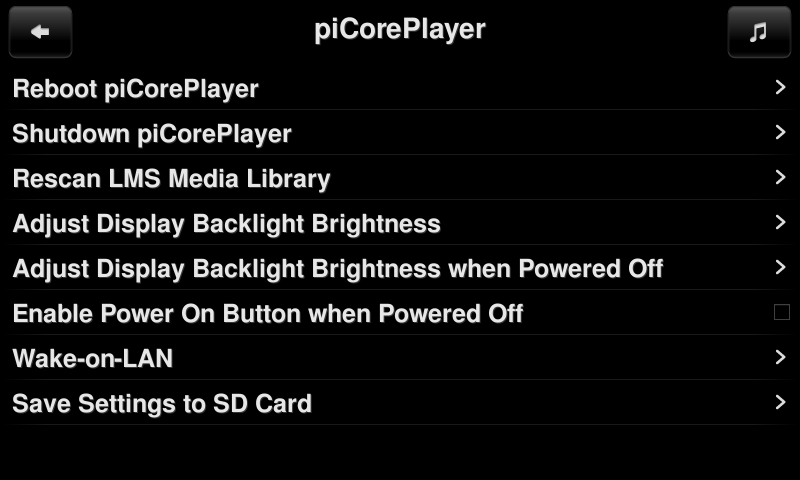piCorePlayer shutdown
pCP Team
6 May 2024
pCP 9.0.0
Shutdown
How to do a shutdown on piCorePlayer.
piCorePlayer “shutdowns” usually activate the following piCore command
exitcheck.sh shutdown.
Warning
Lyrion Media Server (LMS) is a server database application and needs to be shutdown properly:
- Do not just pull the power plug.
- Do a proper shutdown.
Info
The following shutdown methods do the same thing.
Web interface
The shutdown command can be found on the [Main Page] of the piCorePlayer web interface.
- Click [Main Page] > [Shutdown] button on web interface.
Jivelite
To do a shutdown from Jivelite, use the piCorePlayer settings screen.
- Select [Settings] > [piCorePlayer] > “Shutdown piCorePlayer” on the Jivelite screen.

Info
Jivelite’s power button does not do a piCorePlayer shutdown.
Command line interface (CLI)
- Type
pcp sdon the command line for shutdown, or - Type
pcp bson the command line for a backup followed by a shutdown, or - Type
exitcheck.sh shutdown.
See piCorePlayer Command Line Interface (CLI).
Setup CLI interface
- Type
setup. - Select [Main] > [Shutdown].
Hardware shutdown via GPIO (FYI)
Warning
They will probably do a “Raspberry Pi OS” type shutdown rather than “piCore” type shutdown.
- gpio-shutdown
- gpio-poweroff
gpio-shutdown
Name: gpio-shutdown
Info: Initiates a shutdown when GPIO pin changes. The given GPIO pin
is configured as an input key that generates KEY_POWER events.
This event is handled by systemd-logind by initiating a
shutdown. Systemd versions older than 225 need an udev rule
enable listening to the input device:
ACTION!="REMOVE", SUBSYSTEM=="input", KERNEL=="event*", \
SUBSYSTEMS=="platform", DRIVERS=="gpio-keys", \
ATTRS{keys}=="116", TAG+="power-switch"
Alternatively this event can be handled also on systems without
systemd, just by traditional SysV init daemon. KEY_POWER event
(keycode 116) needs to be mapped to KeyboardSignal on console
and then kb::kbrequest inittab action which is triggered by
KeyboardSignal from console can be configured to issue system
shutdown. Steps for this configuration are:
Add following lines to the /etc/console-setup/remap.inc file:
# Key Power as special keypress
keycode 116 = KeyboardSignal
Then add following lines to /etc/inittab file:
# Action on special keypress (Key Power)
kb::kbrequest:/sbin/shutdown -t1 -a -h -P now
And finally reload configuration by calling following commands:
# dpkg-reconfigure console-setup
# service console-setup reload
# init q
This overlay only handles shutdown. After shutdown, the system
can be powered up again by driving GPIO3 low. The default
configuration uses GPIO3 with a pullup, so if you connect a
button between GPIO3 and GND (pin 5 and 6 on the 40-pin header),
you get a shutdown and power-up button. Please note that
Raspberry Pi 1 Model B rev 1 uses GPIO1 instead of GPIO3.
Load: dtoverlay=gpio-shutdown,<param>=<val>
Params: gpio_pin GPIO pin to trigger on (default 3)
For Raspberry Pi 1 Model B rev 1 set this
explicitly to value 1, e.g.:
dtoverlay=gpio-shutdown,gpio_pin=1
active_low When this is 1 (active low), a falling
edge generates a key down event and a
rising edge generates a key up event.
When this is 0 (active high), this is
reversed. The default is 1 (active low).
gpio_pull Desired pull-up/down state (off, down, up)
Default is "up".
Note that the default pin (GPIO3) has an
external pullup. Same applies for GPIO1
on Raspberry Pi 1 Model B rev 1.
debounce Specify the debounce interval in milliseconds
(default 100)
gpio-poweroff
Name: gpio-poweroff
Info: Drives a GPIO high or low on poweroff (including halt). Enabling this
overlay will prevent the ability to boot by driving GPIO3 low.
Load: dtoverlay=gpio-poweroff,<param>=<val>
Params: gpiopin GPIO for signalling (default 26)
active_low Set if the power control device requires a
high->low transition to trigger a power-down.
Note that this will require the support of a
custom dt-blob.bin to prevent a power-down
during the boot process, and that a reboot
will also cause the pin to go low.
input Set if the gpio pin should be configured as
an input.
export Set to export the configured pin to sysfs
timeout_ms Specify (in ms) how long the kernel waits for
power-down before issuing a WARN (default 3000).
More information
The Software and Information is provided "as is" without warranty of any kind, either express or implied, including without limitation any implied warranties of condition, uninterrupted use, merchantability, fitness for a particular purpose, or non-infringement.
Raspberry Pi is a trademark of the Raspberry Pi Foundation.